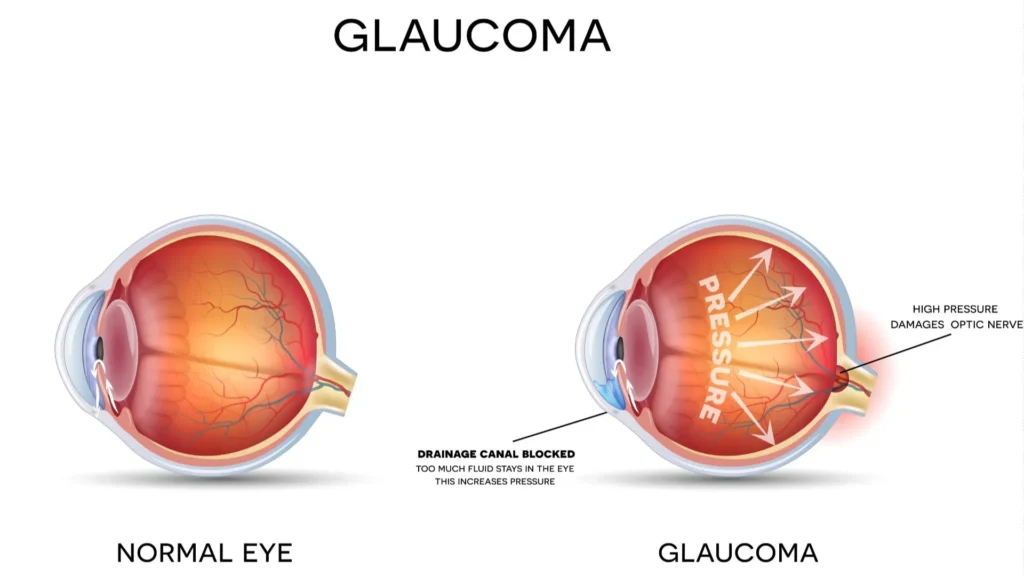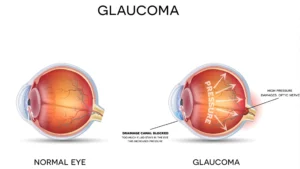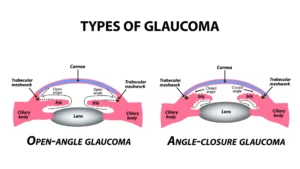Glaucoma is a group of eye diseases that’s characterized by damage to the optic nerve – a nerve that acts as a messenger between the eyes and the brain. It carries electrical signals created by the retina, which are then converted into images once processed by the brain.
Roughly three million Americans have glaucoma and while it’s a condition that can’t be cured, there are ways to control it and treat it. Unfortunately, some people won’t receive the treatment they so desperately need and others will receive it, but not before damaging the optic nerve.
In fact, over 60% of people diagnosed with glaucoma will experience some form of vision loss and over 120,000 Americans are blind as a result of glaucoma – it’s the second-leading cause of blindness in the world. It’s estimated that there are over 60 million cases of glaucoma worldwide.
How Long Does it Take to Go Blind From Glaucoma?
While most patients with glaucoma can expect to experience some form of vision loss, properly treating the disease in a timely manner will greatly reduce an individual’s risk of going blind. With that said, blindness remains a real possibility for those with glaucoma – especially if not treated.
Left untreated, it generally takes glaucoma an average of 10-15 years before causing severe vision loss or blindness. Since glaucoma is widely considered a slow-progressing disease, it usually takes a while before symptoms develop and even longer for them to grow worse.
With that said, there are two major factors that determine how quickly glaucoma progresses and how long it normally takes to go blind from glaucoma – the type of glaucoma and intraocular pressure. Don’t worry, we’re going to break down the relationship in more detail for you below!
Intraocular Pressure (Eye Pressure)
An increase in eye pressure, also known as intraocular pressure, is one of the biggest causes of glaucoma. This is usually a result of an excess of fluid in or around the eye due to a blocked drainage angle. The higher the eye pressure, the higher risk of going blind due to glaucoma.
On average, let’s take a closer look at the relationship between intraocular pressure and going blind from glaucoma:
- 21-25 mmHg – if left untreated, it takes about 15 years for glaucoma to cause blindness.
- 25-30 mmHg – if left untreated, it takes about seven years for glaucoma to cause blindness.
- 30+ mmHg – if left untreated, it takes about three years for glaucoma to cause blindness.
Keep in mind that it’s also possible to go blind from glaucoma with normal eye pressure levels. The main difference is that it’ll progress much more slowly and the symptoms might not be that noticeable for a while – making it harder to detect, unless you see your eye doctor regularly.
Type of Glaucoma
In addition to intraocular pressure, the type of glaucoma the patient is diagnosed with plays a major role in how fast the disease progresses to blindness if left untreated. That’s why a proper and accurate diagnosis is so important to ensuring the right care and treatment is administered.
Let’s take a closer look at the relationship between the type of glaucoma and how quickly the disease progresses to blindness when left untreated:
- Primary Open-Angle Glaucoma – this type of glaucoma progresses very slowly and symptoms aren’t always present in the early stages. If left untreated, it could take up to a decade before going blind.
- Normal-Tension Glaucoma – this type of glaucoma is similar to open-angle glaucoma, with the main difference being normal eye pressure levels. The disease will progress rather slowly.
- Acute Angle-Closure Glaucoma – this type of glaucoma is considered a medical emergency and requires immediate medical assistance. If left untreated, it could lead to blindness within days.
- Congenital Glaucoma – this type of glaucoma is present in babies at birth and is a major cause for childhood blindness. If left untreated, permanent vision loss can occur within several years.
- Secondary Glaucoma – the rate of second glaucoma progression will largely depend on the medical condition that’s causing the eye disease. Treating the medical condition will relieve the glaucoma symptoms.
It doesn’t matter what type of glaucoma you’re living with, blindness is a real possibility and one that tens of thousands of people experience in the United States alone every single day. Once diagnosed, follow your treatment plan and take the advice of your local ophthalmologist.
How to Reduce the Risk of Blindness From Glaucoma
While there’s no cure for glaucoma to this day – and optic nerve damage can’t be reversed – there are ways to control, manage, and treat the symptoms of glaucoma. It often takes early detection, a proper diagnosis, and a proven and effective treatment plan.
Let’s take a look at some of our most prominent tips when reducing the risk of going blind from glaucoma:
- Make sure you’re scheduling regular appointments with your eye doctor to detect it early and monitor progression
- Understand your family history and what your risk factors are
- Partake in a regular, moderate exercise routine weekly
- Always make sure you’re eating a healthy, well-balanced diet daily
- Wear eye protection when playing sports or using power tools
- Manage and control high blood pressure levels
- Always follow the direct advice of your eye care professional
Going blind is often the worst case scenario when suffering from glaucoma, but it’s a rather rare occurrence in the grand scheme of things. Still, glaucoma can result in various other unwanted symptoms that affect vision and make it difficult to live a happy, healthy, and rewarding life.
Contact Milwaukee Eye Surgeons Today!
Are you experiencing symptoms of glaucoma? Are you starting to lose peripheral vision? Do you have blurred vision or do you need more light in order to see clearly? Are you going blind as a result of glaucoma? If you answered yes to any of these questions, time is of the essence.
Glaucoma can have serious consequences if not treated in a timely manner. To ensure you reduce the amount of damage to your optic nerve moving forward and prevent any further vision loss, contact us at Milwaukee Eye Surgeons and schedule an eye exam immediately. We can help you treat glaucoma, even if that requires glaucoma surgery!





